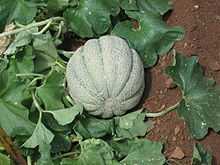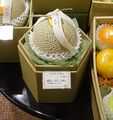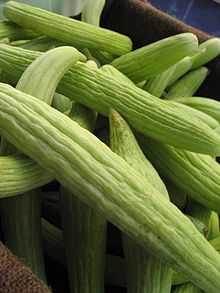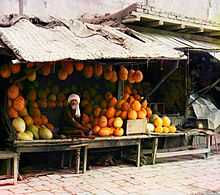Muskmelon
| Muskmelon | |
|---|---|
 | |
| Scientific classification | |
| Kingdom: | Plantae |
| (unranked): | Angiosperms |
| (unranked): | Eudicots |
| (unranked): | Rosids |
| Order: | Cucurbitales |
| Family: | Cucurbitaceae |
| Genus: | Cucumis |
| Species: | C. melo |
| Binomial name | |
| Cucumis melo L. | |
Muskmelon (Cucumis melo) is a species of melon that has been developed into many cultivated varieties. These include smooth skinned varieties such as honeydew, crenshaw and casaba, and different netted cultivars (cantaloupe, Persian melon and Santa Claus or Christmas melon). The Armenian cucumber is also a variety of muskmelon, but its shape, taste, and culinary uses more closely resemble those of a cucumber. The large number of cultivars in this species approaches that found in wild cabbage, though morphological variation is not as extensive. It is a fruit of a type called pepo. Muskmelon is native to Iran, Anatolia, Armenia, and adjacent areas on the west and the east which is believed to be their center of origin and development, with a secondary center including the northwest provinces of India and Afghanistan. Although truly wild forms of C. melo have not been found, several related wild species have been noted in those regions.
Genetics
| NCBI genome ID | 10697 |
|---|---|
| Ploidy | diploid |
| Genome size | 374.77 Mb |
| Number of chromosomes | 12 |
| Year of completion | 2012 |
Muskmelons are monoecious plants. They do not cross with watermelon, cucumber, pumpkin, or squash, but varieties within the species intercross frequently.[1] The genome of Cucumis melo L. was first sequenced in 2012.[2]
Nutrition
Cantaloupe melons are an excellent source of vitamin A and vitamin C, and a good source of potassium.[3]
Uses
In addition to their consumption when fresh, melons are sometimes dried. Other varieties are cooked, or grown for their seeds, which are processed to produce melon oil. Still other varieties are grown only for their pleasant fragrance.[4] The Japanese liqueur Midori is flavored with muskmelon.
Gallery
-
.jpg)
Galia Melon
-

Japanese melon intended as a high-priced gift. The pictured melon is 6300 yen, or about 62 US dollars).
-

Squared Melon grown in Atsumi District, Aichi Japan. It is known as "Kakumero".
-

The Armenian cucumber, despite the name, is actually a type of muskmelon.
-

Melon vendor in Samarkand, 1915
See also
- Bailan melon
- Cantaloupe
- Crane Melon
- Cucumis
- Galia
- Hami Melon
- Honeydew
- Melon baller
- Montreal melon
- Persian melon
- Piel de Sapo
- Sugar melon
- Melon Day
References
Notes
- ↑ Muskmelons Originated in Persia. http://aggie-horticulture.tamu.edu/archives/parsons/publications/vegetabletravelers/muskmelon.html
- ↑ The genome of melon (Cucumis melo L.) . http://www.pnas.org/content/early/2012/06/28/1205415109.short
- ↑ Nutrition Facts for melons, cantaloupe
- ↑ National Research Council (2008-01-25). "Melon". Lost Crops of Africa: Volume III: Fruits. Lost Crops of Africa 3. National Academies Press. ISBN 978-0-309-10596-5. Retrieved 2008-07-17.
Sources
- Mabberley, D.J. 1987. The Plant Book. A portable dictionary of the higher plants. Cambridge University Press, Cambridge. ISBN 0-521-34060-8.
- Magness, J.R., G.M. Markle, C.C. Compton. 1971. Food and feed crops of the United States. Interregional Research Project IR-4, IR Bul. 1 (Bul. 828 New Jersey Agr. Expt. Sta.).
- Desai, B.B. (2004). Seeds Handbook: Biology, Production, Processing, and Storage, Vol. 103. CRC Press. ISBN 0-8247-4800-X.
- http://aggie-horticulture.tamu.edu/archives/parsons/publications/vegetabletravelers/muskmelon.html
External links
| Wikimedia Commons has media related to Cucumis melo. |
- Cucumis melo L. – Purdue University, Center for New Crops & Plant Products.
- Sorting Cucumis names – Multilingual multiscript plant name database
- Cook's Thesaurus: Melons – A great online list of names and pictures.
- Muskmelons Originated in Persia
| |||||||||||||||||||||||||||||||||||||||||||||